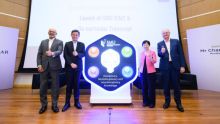Pioneering sustainable water management for a better future

Water, the essence of life, is a precious resource that sustains our planet. Despite its importance, water is often undervalued and taken for granted: the average Singaporean used 158 litres of water a day in 2021 — up from 141 litres a person a day in 2019. By 2025, the United Nations estimates that 2.8 billion people will suffer from water scarcity, leading to severe consequences for our ecosystems and communities.
World Water Day, celebrated annually on March 22, presents a unique opportunity to raise awareness about the significance of water and advocate for its conservation. To commemorate the occasion, SMU teamed up with Singapore's national water agency, PUB, to participate in the annual City Turns Blue campaign. As part of the initiative, SMU illuminated its buildings an enchanting blue and encouraged its community to dress in the same shade, symbolising the critical role of water in our lives and the pressing need to conserve and manage it sustainably.
This year, the University’s student environmental club SMU Verts also held an interactive photography competition. It included an activity for participants to learn more about Singapore’s water sources — local catchment, imported water, high-grade reclaimed water and desalinated water — and share their reflections on the significance of saving water.
Water conservation on campus
Institutions of higher education, such as SMU, play a crucial role in promoting sustainability and educating the next generation of leaders about the importance of responsible water management.
Since its inception, the University has been committed to developing a clean, green, and healthy environment. It also plans to take sustainability a step further and ensure that sustainability principles guide its organisational behaviour, including how it plans, manages, and deploys its resources.
SMU has therefore adopted a concerted effort to raise awareness among its faculty, staff, and students about the importance of conserving water and energy — including the implementation of a Sustainability Blueprint to help chart its actions across key strategies.
Sundaravadivelan Selvam, SMU’s Vice President for Campus Infrastructure and Services, said, “SMU has undertaken several sustainable water management initiatives to achieve its goal of reducing water use intensity by 35 per cent by 2025 compared to a 2011 baseline. These initiatives aim to promote responsible water management practices on campus and inspire individuals to adopt sustainable behaviours in their daily lives.”
A significant move by SMU is the harvesting and reusing of rainwater. The University has installed two underground water tanks beneath Campus Green and the School of Economics/ School of Computing and Information Systems 2 building, which can harvest up to 100,000 litres of rainwater. The harvested water is now reused for landscape irrigation on Campus Green. Furthermore, SMU collects condensate water from its air-conditioning systems to irrigate plants on campus grounds and green walls.
In today’s digital economy, technology can also be leveraged to manage this valuable resource for ensuring long-term sustainability. As such, SMU has implemented smart solutions to minimise water wastage on campus. The University's facilities management team uses a smart water meter system that alerts them to any spikes in water usage, indicating a possible leak. By acting promptly in response to each alert, the team can save up to 10,000 to 12,000 litres of water. This is approximately equivalent to the typical average monthly water consumption of an HDB 3-room flat.
SMU's sustainable water management initiatives demonstrate the University's commitment to creating a more sustainable future for all. “By promoting responsible water management practices on campus and inspiring individuals to adopt sustainable behaviours in their daily lives, SMU is working towards a more sustainable world for ourselves and future generations,” Mr Selvam added.


